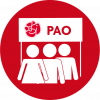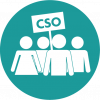Trade Union Academy

The role of trade unions
Why do we need trade unions? How does the Palme Center aim to support unions?The right to work and the right to form and join a union are human rights. We are human beings and should be treated as such, also in the workplace. We have the right to a fair and equitable salary and to the greatest possible security and safety at work.
The basis of the trade union is solidarity. When we form a union we give each other a mutual promise. We promise we will never work on less favourable terms or at a lower salary than we have agreed. Together we are strong. Together we can make demands and make the employer listen to us. And the more members we have, the greater is our opportunity to improve our conditions through collective bargaining and influence the workplace and society as a whole.
No one should feel excluded on the basis of gender, age, religion, ethnicity, race, sexual orientation or disability. Our trade union solidarity has no borders or limits.
The Palme Center’s work with unions
The Palme Center collaborates with trade unions around the world to advance equality and workers’ rights and to strengthen the trade union movement.
Our aim is to….
- Support trade unions in finding innovative ways to mobilise, particularly informal and precarious workers.
- Foster alliance-building between the trade union movement, political parties and civil society organisations
- Support the trade union movement in developing policy and reform proposals for progressive and sustainable economic development.
Toolbox
Forms for application and reporting
All templates and documents that may be needed in the collaboration can be found here – from agreements to budget and accounting forms.
Method material
Tools and materials that can be helpful in your work. Take a look at the material How to run a trade union, or more general material on themes such as gender equality, climate, anti-corruption and risk management.
Recorded trainings
You will find upcoming workshops under News for all partners. Here you can take part of recordings of past trainings on topics such as climate or gender integration.
Project management
From start to finish—here's how to run a project with the support of the Palme Center:1. Planning and application
How do you start a new collaborative project together with the Palme Center and a Swedish partner organisation? Here we have gathered information about what to think about during the planning and application phase.
2. Organisational development
It’s not just about carrying out a certain project: strengthening your organisation itself is a key goal. Read more about how to improve your organisation’s capacity to reach your goals.
3. Follow-up plan
Are you on the right track? This is how you follow up the results from the activities you carry out, document the results and report the costs.
4. Finances in order
Learn more about the specific rules, regulations and requirements that apply to project support and core/organisation support financed by the Olof Palme International Center.
5. The annual report
The annual report is where you document the results you have achieved, the changes you have made and the knowledge you have gained during the year.
Perspectives that need to be part of all work
In order for our operations to contribute to positive and progressive development, these perspectives must be integrated into all projects:Gender equality
All projects run with funding from the Palme Center must promote gender equality and non-discrimination.
Environment and climate
The climate and environmental crisis is humanity’s greatest challenge. All operations need to contribute to slowing it down, or to increasing society’s ability to cope with the consequences.
Anti-corruption
Corruption is an obstacle to democracy and human rights. That is why it’s important to have zero tolerance for corruption. To prevent and deter corruption is to contribute to democratic development.
Conflict sensitivity
A conflict that is not handled peacefully and constructively can grow and become destructive. To minimize the risk of negative effects of our change work, it is important to analyze the context from a conflict sensitivity perspective.








 Palme Resource Center
Palme Resource Center



